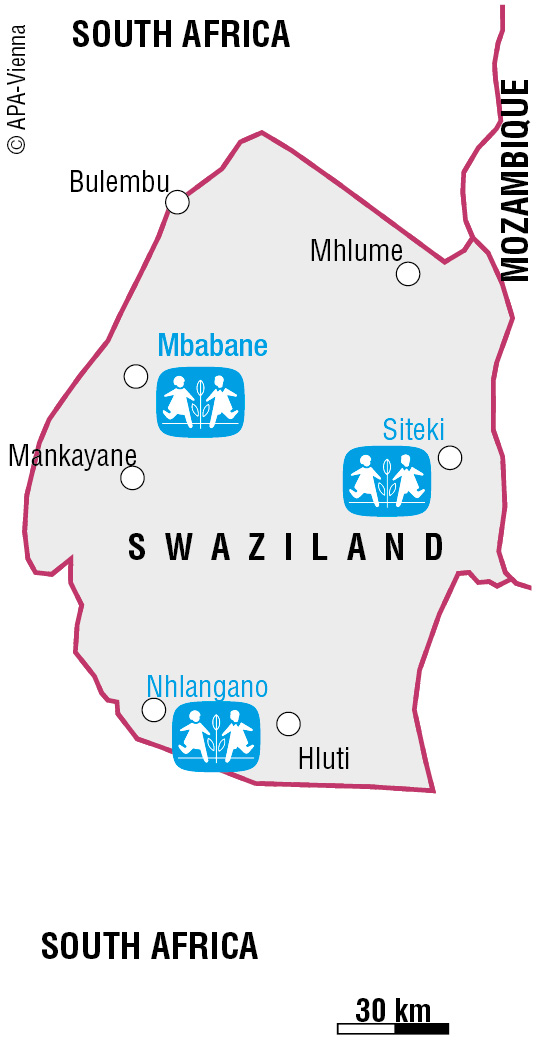
Vi er i Eswatini
Poverty is widespread
Eswatini is a landlocked country situated in Southern Africa. The majority of the country's population live in rural or semi-rural settings and follow traditional ways of life.
It is one of the poorest countries in the world. Over 40 per cent of its population live on less than US$ 1,25 per day. Because of unfavourable climate conditions and low agricultural productivity, extreme poverty predominantly affects the country's rural population. While the standard of living continues to decline, unemployment is going up. Tens of thousands lack access to potable water, decent housing and sanitation facilities. Food shortages are widespread, particularly in rural areas, and a large number of school-aged children do not receive an education.
HIV/AIDS pandemic affects tens of thousands
Eswatini is heavily marked by the HIV/AIDS pandemic. At a prevalence rate of 26 per cent, the extent to which the disease affects the population is beyond comparison, even for African standards. AIDS profoundly depletes the country's labour force as many Swazis die in their most productive years. In this tiny African nation of only 1.3 million, 210,000 citizens are HIV-positive. Due to the heavy toll that AIDS has been taking, life expectancy has plummeted and stands now at only 49 years. As a result of heavy social stigma associated with the virus there are no statistics on the exact number of AIDS-related deaths
According to reports, Eswatini is both a destination and source country for women and children subjected to forced labour, including commercial sex work and domestic servitude. Thousands of children, in particular girls, are "exported" to South Africa and Mozambique. Swazi boys are exploited within the country's borders through forced labour in agriculture and street merchandising. At the same time, many Mozambican boys have migrated to Eswatini. They wash cars, herd livestock or engage in other agricultural activities. Some of these boys have become victims of forced labour. Although the government of Eswatini has taken important steps to protect trafficking victims, a lot remains to be done in order to root out the problem.
Children need support and protection
Roughly 120,000 children in Eswatini are orphans and grow up without their parents. The vast majority have lost their parents to AIDS, a disease which affects the country's youngest segment of population most of all. Most parents of children who are HIV-positive cannot afford retroviral therapy. Many of these children are cut off from basic health services and education. Nonetheless, Eswatini has been quite successful with regards to the prevention of mother-to-child transmission of HIV.
Throughout the last ten years, a number of programmes targeting child health, education and protection have been introduced. Although there has been noticeable progress, the country's under-five-mortality rate of 80 per 1,000 live births continues to be fairly high. Many families are struggling to put food on the table for their children as nearly one in ten children is severely undernourished. Owing to HIV/AIDS and high levels of poverty, the phenomenon of children raising children is quite common in Eswatini. This explains why many young Swazis miss out on a decent education. In Eswatini, about one out of every five primary-school-aged children is not enrolled in primary school.
SOS Children's Villages in Eswatini
The work of SOS Children's Villages in Eswatini started in the 1980s. An agreement was signed between the organisation and the Kingdom of Eswatini, and the national SOS Children's Villages association was founded in 1987.
At present, SOS Children's Villages is supporting Swazi children and young people in three different locations by providing day care and medical assistance. Children whose families cannot take care of them can find a loving home in one of the SOS families.
In mid-2000, SOS Children's Villages launched an SOS Emergency Relief Programme to help the numerous families affected by heavy floods in the vicinity of Mbabane. In 2002, persistent droughts and food shortages affected the entire country. Again, an SOS Emergency Relief Programme was set up and many families were provided with food and medical assistance.
Due to increasing rates of HIV/AIDS, the organisation decided to implement SOS Family Strengthening Programmes, aiming to enable children who are at risk of losing the care of their family to grow up within a caring family environment.